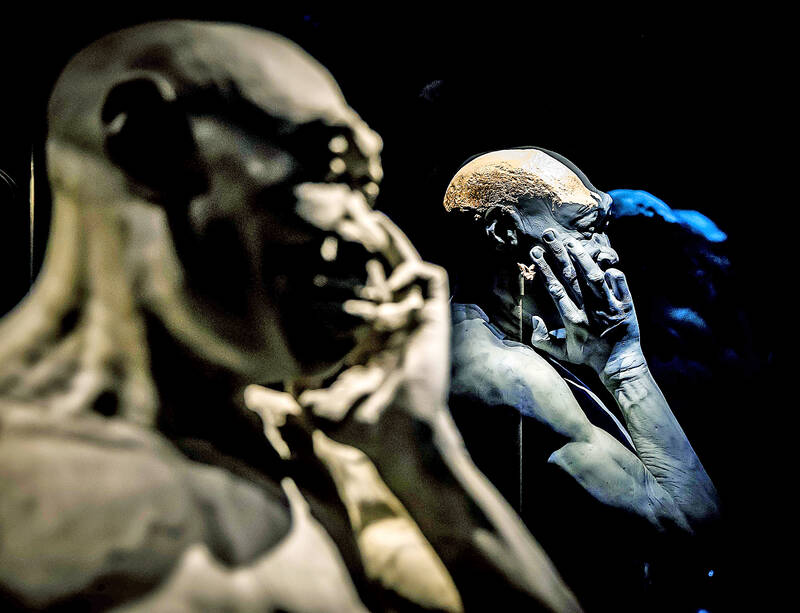Indonesia has asked the Netherlands to hand back at least eight art pieces and natural history collections that were acquired during the colonial era, including the remains of a landmark hominid known as “Java Man.”
Identified as the first-ever example discovered of a Homo erectus, a forerunner of anatomically modern humans, “Java Man” is the centerpiece of an important collection at the Naturalis Biodiversity Center in Leiden.
It comprises a femur and most of a cranium, discovered on the Indonesian island of Java by Dutch anatomist and geologist Eugene Dubois in 1891-1892, when Indonesia was still a colony of the Netherlands.

Photo: EPA-EFE
Asked about Jakarta’s request, Dutch Ministry of Education, Culture and Science spokesman Jules van de Ven on Tuesday said Indonesia made the request “during the summer.”
Other pieces sought by Indonesia in the Dubois collection include the horse-riding reins of Prince Diponegoro, a Javanese royal who opposed Dutch colonial rule in the 19th century, and the so-called “Lombok treasure” of golden artifacts, the Dutch daily newspaper Trouw reported.
Van de Ven said a government-appointed commission would start a probe in December and make recommendations to Dutch State Secretary for Culture and Media Gunay Uslu, adding that he could not give a timeline for the work.
The Dutch government had “very constructive” discussions with their Indonesian counterparts, Ven added.
“Not only did we speak about returns, but also about cooperation in scientific studies and exhibitions,” he said.
The Naturalis museum told Trouw it “understood the Indonesian claim,” but was surprised that Indonesia viewed objects of natural history in a similar vein as historical artifacts.
The Java skull would not have been found if it was not for Dubois, it added.
Indonesia’s approach to its former colonial master follows that of African countries in pressing Britain, France, Germany and Belgium to return historic or cultural items that were looted during their rule.
In the past few years the Netherlands has started to grapple with the legacy of its colonialism in the former Dutch East Indies.
The archipelago declared its independence in August 1945 after being under Dutch rule for three centuries. Dutch recognition took place in 1949 after four years of bloody fighting.
The Netherlands apologized in February after a study found that the Dutch army used “systematic and extreme violence” during the independence war.

Yemen’s separatist leader has vowed to keep working for an independent state in the country’s south, in his first social media post since he disappeared earlier this month after his group briefly seized swathes of territory. Aidarous al-Zubaidi’s United Arab Emirates (UAE)-backed Southern Transitional Council (STC) forces last month captured two Yemeni provinces in an offensive that was rolled back by Saudi strikes and Riyadh’s allied forces on the ground. Al-Zubaidi then disappeared after he failed to board a flight to Riyadh for talks earlier this month, with Saudi Arabia accusing him of fleeing to Abu Dhabi, while supporters insisted he was

‘SHOCK TACTIC’: The dismissal of Yang mirrors past cases such as Jang Song-thaek, Kim’s uncle, who was executed after being accused of plotting to overthrow his nephew North Korean leader Kim Jong-un has fired his vice premier, compared him to a goat and railed against “incompetent” officials, state media reported yesterday, in a rare and very public broadside against apparatchiks at the opening of a critical factory. Vice Premier Yang Sung-ho was sacked “on the spot,” the state-run Korean Central News Agency said, in a speech in which Kim attacked “irresponsible, rude and incompetent leading officials.” “Please, comrade vice premier, resign by yourself when you can do it on your own before it is too late,” Kim reportedly said. “He is ineligible for an important duty. Put simply, it was

The Chinese Embassy in Manila yesterday said it has filed a diplomatic protest against a Philippine Coast Guard spokesman over a social media post that included cartoonish images of Chinese President Xi Jinping (習近平). Philippine Coast Guard spokesman Jay Tarriela and an embassy official had been trading barbs since last week over issues concerning the disputed South China Sea. The crucial waterway, which Beijing claims historic rights to despite an international ruling that its assertion has no legal basis, has been the site of repeated clashes between Chinese and Philippine vessels. Tarriela’s Facebook post on Wednesday included a photo of him giving a

Syrian President Ahmed al-Sharaa on Sunday announced a deal with the chief of Kurdish-led forces that includes a ceasefire, after government troops advanced across Kurdish-held areas of the country’s north and east. Syrian Kurdish leader Mazloum Abdi said he had agreed to the deal to avoid a broader war. He made the decision after deadly clashes in the Syrian city of Raqa on Sunday between Kurdish-led forces and local fighters loyal to Damascus, and fighting this month between the Kurds and government forces. The agreement would also see the Kurdish administration and forces integrate into the state after months of stalled negotiations on